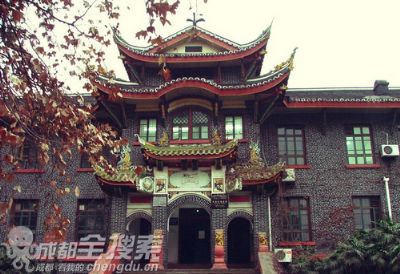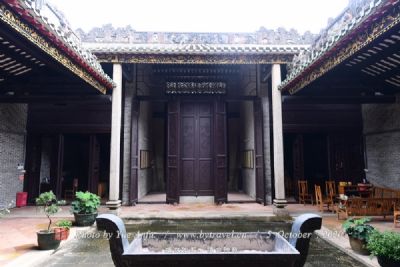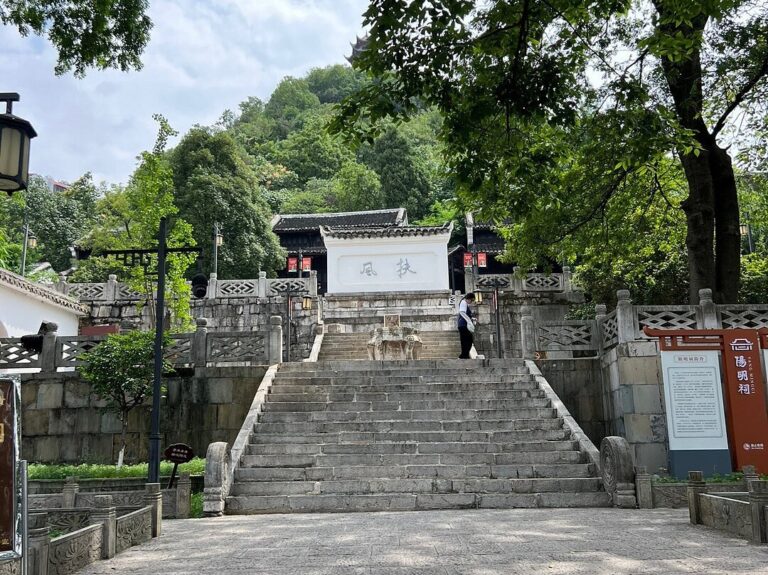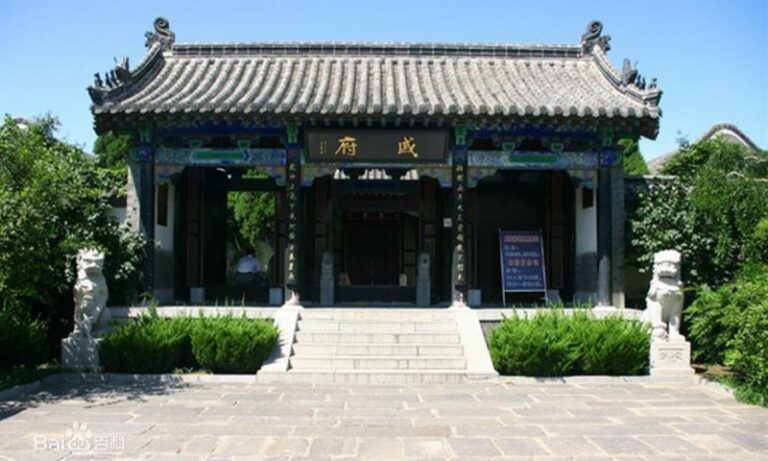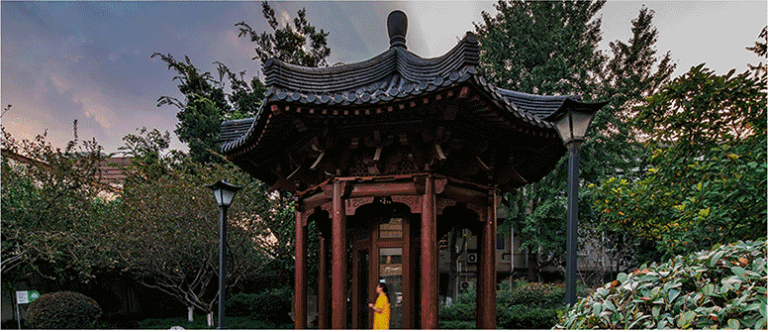Dali Midu Wutai Dasi: Your Ultimate Guide to Yunnan’s Scenic and Spiritual Retreat
An Essential Guide to Visiting Dali Midu Wutai Dasi
In This Guide
- An Essential Guide to Visiting Dali Midu Wutai Dasi
- The Rich History of Dali Midu Wutai Dasi
- Main Highlights: What to See at Dali Midu Wutai Dasi
- Planning Your Visit: A Practical Guide
- Tickets, Hours, and Booking
- How to Get There
- Local Cuisine and Accommodation
- Frequently Asked Questions
- Final Thoughts on Your Trip
Nestled in the heart of Yunnan Province, Dali Midu Wutai Dasi, or Wutai Temple, stands as a testament to the rich cultural heritage and spiritual significance of the region. With a history spanning over 600 years, this ancient temple complex is not just an architectural marvel but also a serene sanctuary for those seeking solace and enlightenment amid the breathtaking natural beauty that Yunnan is renowned for.
As you approach Wutai Temple, you’ll be greeted by lush greenery and the striking backdrop of the Wutai Mountain range. The temple is known for its well-preserved structures, which reflect traditional Chinese Buddhist architectural styles, making it an ideal spot for both history enthusiasts and spiritual seekers. Visitors can explore the intricately designed halls, admire the ornate carvings, and soak in the tranquil atmosphere that envelops the site.
But Wutai Temple is more than just a place of worship; it is a gateway to understanding the harmonious relationship between nature and spirituality in Chinese culture. Surrounded by scenic vistas and a peaceful ambiance, this sacred site encourages reflection and connection with the divine. Whether you’re an avid traveler, a history buff, or someone looking to reconnect with nature, Wutai Temple offers a unique experience that resonates with all who visit.
In this guide, we will delve into the various aspects of Wutai Temple, from its historical significance and architectural highlights to the natural wonders that surround it. Prepare to embark on a journey that intertwines culture, history, and breathtaking landscapes, making Dali Midu Wutai Dasi a must-visit destination in Yunnan.
The Rich History of Dali Midu Wutai Dasi
Dali Midu Wutai Dasi, or Five-Platform Temple, is a historical gem nestled in the picturesque landscape of Midu County, Yunnan Province. This temple, dating back over 600 years, stands as a testament to the rich cultural and religious heritage of the area, making it a significant site for both spiritual seekers and history enthusiasts.
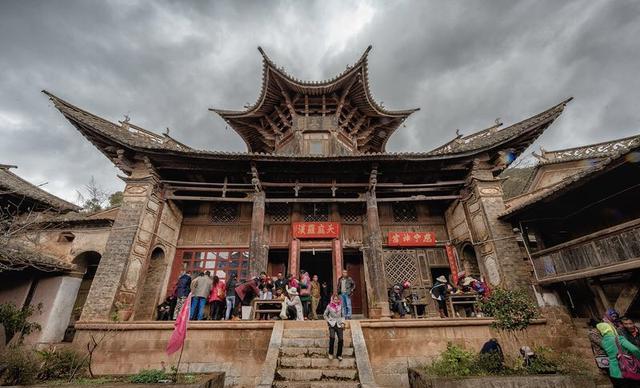
Dali Midu Wutai Dasi.
The origins of the temple trace back to the Ming Dynasty when it was built to honor the Buddhist traditions that have flourished in this region for centuries. It is renowned for its unique architectural style, which blends traditional Chinese elements with local influences. The temple complex is meticulously designed, featuring a series of ancient buildings arranged in a harmonious layout that reflects the principles of Feng Shui. Visitors can marvel at the intricate wood carvings, ornate roofs, and serene courtyards that invite contemplation and peace.
One of the defining features of Dali Midu Wutai Dasi is its connection to the local history of the Nanzhao Kingdom, which thrived from the 8th to the 10th centuries. This kingdom was known for its cultural diversity, with influences from Tibetan Buddhism, Han Chinese culture, and indigenous traditions. The temple served not only as a place of worship but also as a cultural center where various Buddhist teachings and practices were shared among the local populace.
Over the centuries, Dali Midu Wutai Dasi has witnessed numerous historical events, including the rise and fall of dynasties, the spread of Buddhism, and the interactions between different ethnic groups in the region. Despite facing challenges such as natural disasters and political upheaval, the temple has remained a vital part of the community, continuing to attract pilgrims and tourists alike.
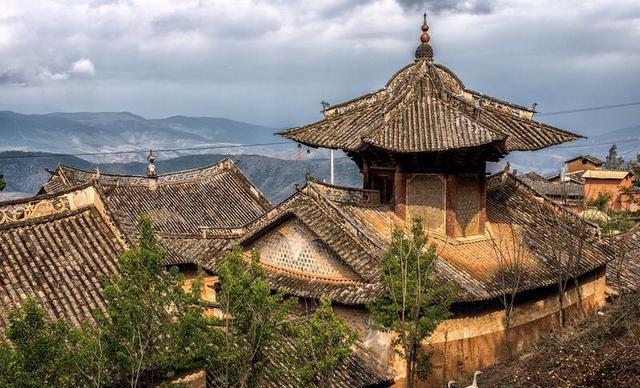
Dali Midu Wutai Dasi.
In recent years, efforts have been made to restore and preserve the temple, allowing it to remain an important symbol of Yunnan’s cultural heritage. Today, Dali Midu Wutai Dasi not only serves as a spiritual sanctuary but also as an educational site where visitors can learn about the region’s rich history and the enduring legacy of Buddhism in Chinese culture.
As you explore the serene environment of Dali Midu Wutai Dasi, take a moment to appreciate the layers of history that have shaped this remarkable site. It stands as a reminder of the enduring human spirit and the cultural tapestry that continues to thrive in Yunnan, inviting travelers to reflect on the past while embracing the beauty of the present.
Main Highlights: What to See at Dali Midu Wutai Dasi
Dali Midu Wutai Dasi, also known as the Five-Platform Temple, is a captivating destination nestled in the heart of Yunnan Province, China. With its rich history, stunning architecture, and serene surroundings, this temple complex is a must-visit for travelers seeking both cultural immersion and natural beauty. Here are the key highlights that make this site a standout attraction:
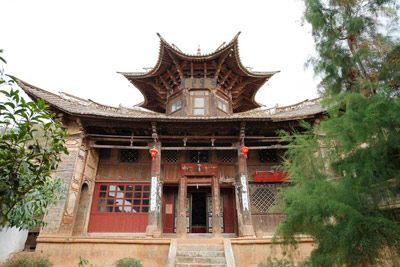
Dali Midu Wutai Dasi.
-
Historical Significance: The Five-Platform Temple boasts over 600 years of history, making it one of the oldest and most well-preserved architectural sites in the region. Originally built during the Ming Dynasty, its ancient structures provide a fascinating glimpse into the architectural styles and religious practices of the time.
-
Architectural Marvel: The temple complex is renowned for its exquisite layout and design, featuring intricate carvings and traditional Chinese architectural elements. Visitors can wander through beautifully arranged courtyards and admire the ancient halls adorned with Buddhist statues and artwork.
-
Scenic Location: Situated approximately 25 kilometers southwest of Midu County, the temple is enveloped by breathtaking landscapes. The surrounding mountains and lush greenery create a tranquil atmosphere, perfect for reflection and spiritual contemplation.
-
Cultural Experience: The Five-Platform Temple serves as an active religious site, where visitors can observe local monks in their daily routines and participate in traditional ceremonies. This offers a unique opportunity to engage with the spiritual culture of the area.
-
Accessibility to Nature: In addition to its historical and cultural significance, the temple is a gateway to some of Yunnan’s most beautiful natural attractions. Nearby, visitors can explore the Eastern Mountain National Forest Park, known for its diverse ecosystems, hiking trails, and stunning vistas.
-
Local Culinary Delights: While visiting the temple, take the time to sample local Yunnanese cuisine. The area is famous for its fresh ingredients and unique flavors, providing an excellent opportunity to indulge in regional dishes that complement your cultural exploration.
-
Photographic Opportunities: The harmonious blend of ancient architecture and stunning natural landscapes makes the Five-Platform Temple a photographer’s paradise. Capture the essence of Yunnan’s beauty as you explore the complex and its surroundings.
A visit to Dali Midu Wutai Dasi is more than just a sightseeing trip; it’s an immersive experience that connects you to the rich cultural tapestry of Yunnan while offering a peaceful retreat from the hustle and bustle of modern life. Whether you’re a history buff, a nature enthusiast, or simply seeking serenity, this temple is sure to leave a lasting impression.
Planning Your Visit: A Practical Guide
Practical Guide to Dali Midu Wutai Dasi
Visiting Dali Midu Wutai Dasi, also known as the Five-Platform Temple, offers an enriching experience steeped in history and natural beauty. Here’s how to make the most of your trip to this remarkable destination.
Getting There
Location: Dali Midu Wutai Dasi is situated approximately 25 kilometers southwest of the county seat of Midu in Dali Prefecture, Yunnan Province.
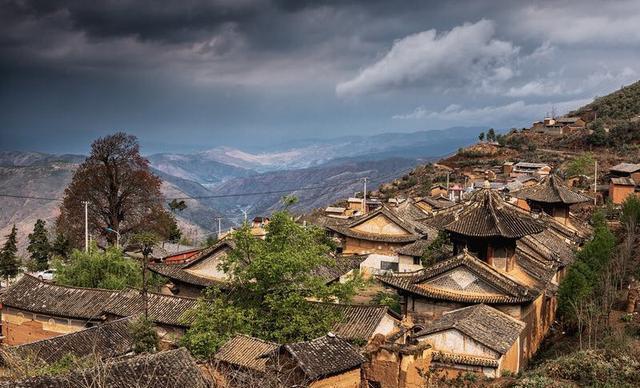
Dali Midu Wutai Dasi.
Transportation:
– By Car: The most convenient way to reach the temple is by car. You can hire a taxi or use a ride-hailing app for a direct trip from Dali or within Midu.
– Public Transport: Buses frequently run from Dali to Midu County. From the Midu bus station, you can catch a local bus or taxi to the temple.
Best Time to Visit
The ideal time to visit is during the spring (March to May) and autumn (September to November) months when the weather is mild and the natural scenery is at its most vibrant. The rainy season, from June to August, can make travel difficult due to mudslides and heavy rainfall.
Admission Fees
Entry to Dali Midu Wutai Dasi typically requires a small fee. It is advisable to check any updated prices or special rates for students or groups before your visit. Bring cash as smaller sites may not accept card payments.
What to Expect
Architectural Highlights: The Five-Platform Temple is a significant historical site boasting over 600 years of history. The temple complex showcases traditional Chinese architecture, with intricate carvings, ancient statues, and a serene atmosphere that invites visitors to explore and reflect.
Natural Surroundings: The temple is located in a picturesque mountainous area, perfect for short hikes and nature walks. Surrounding trails offer stunning views of the lush landscape and rich biodiversity.
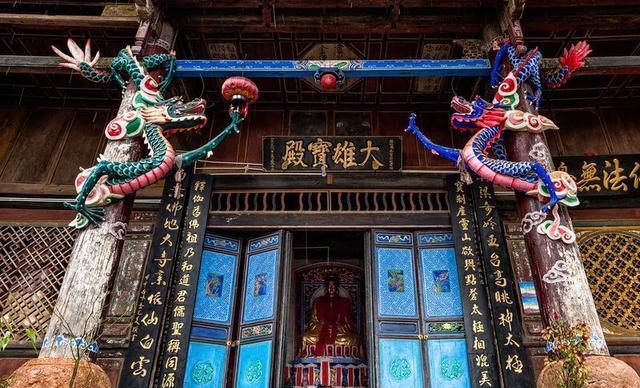
Dali Midu Wutai Dasi.
Activities
- Sightseeing: Take time to explore the temple grounds, including its various halls and pavilions. Each area has unique features and historical significance.
- Photography: The stunning architecture set against the backdrop of the mountains provides countless opportunities for photography enthusiasts.
- Cultural Experience: Engage with local monks and learn about the Buddhist practices that take place at the temple. It’s a chance to gain insight into the spiritual life of the area.
Nearby Attractions
- Nanzhao Iron Pillar: Just a short drive away, this ancient relic is a testament to the rich history of the Nanzhao Kingdom.
- Pearl Spring: A natural spring known for its crystal-clear waters, ideal for a refreshing stop.
- Tian Sheng Bridge: Renowned for its breathtaking views, this natural rock bridge is perfect for a scenic hike.
Dining Options
While dining options near the temple may be limited, you can find local eateries in Midu where you can indulge in authentic Yunnan cuisine. Try dishes such as “Crossing the Bridge Noodles” or local mushroom specialties.
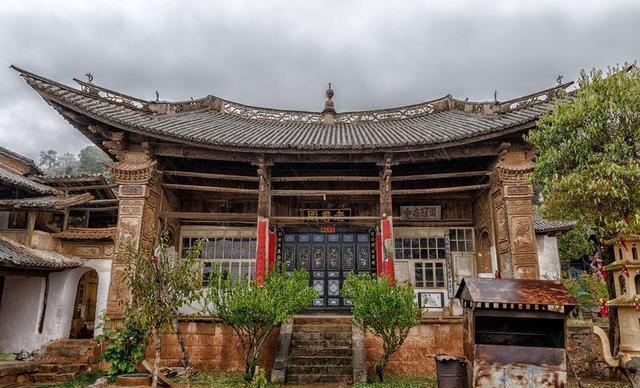
Dali Midu Wutai Dasi.
Accommodation
For those wishing to stay overnight, consider booking a hotel in Midu or nearby Dali. There are various accommodations ranging from budget hostels to more luxurious hotels. Look for places that offer easy access to transportation and local attractions.
Tips for a Smooth Visit
- Dress Appropriately: As a religious site, it’s respectful to wear modest clothing. Comfortable shoes are recommended for walking and hiking.
- Stay Hydrated: Bring water, especially if you plan to hike or spend a long time outdoors.
- Respect Local Customs: Be mindful of the local culture and traditions; always ask for permission before photographing people, especially monks.
By following this practical guide, you can ensure a fulfilling and memorable visit to Dali Midu Wutai Dasi, experiencing both its spiritual significance and natural beauty. Enjoy your journey!
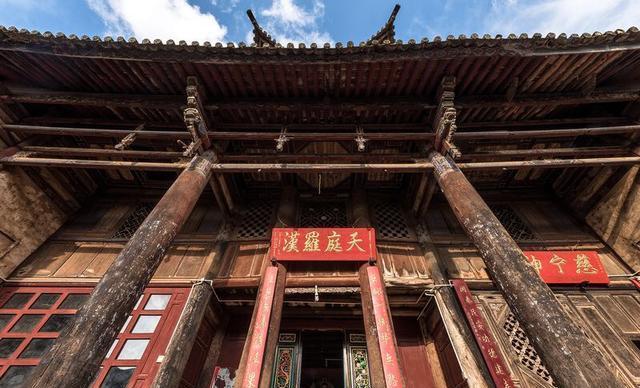
Dali Midu Wutai Dasi.
Tickets, Hours, and Booking
When planning your visit to Dali Midu Wutai Dasi (五台大寺), it’s essential to have the right information regarding tickets to ensure a smooth experience.
Ticket Information
-
Admission Fee: The entrance fee for Dali Midu Wutai Dasi is approximately 50 CNY (Chinese Yuan). This fee grants you access to the temple complex, which showcases the stunning architecture and serene ambiance of one of Yunnan’s most significant Buddhist sites.
-
Opening Hours: The temple is generally open to visitors from 8:00 AM to 5:00 PM. However, it’s advisable to check for any seasonal changes in operating hours or specific closures that may occur due to religious events or maintenance.
-
Booking Options: While tickets can often be purchased at the site, it is recommended to check online platforms for advance bookings, especially during peak travel seasons. This can save time and ensure you secure your entry on busy days.
-
Location: Dali Midu Wutai Dasi is located about 25 kilometers southwest of the city of Dali, making it easily accessible by car or public transportation from the city center.
-
Additional Costs: Keep in mind that while the entrance fee covers access to the temple grounds, there may be additional costs for guided tours or specific activities within the complex.
Visiting Dali Midu Wutai Dasi offers a unique glimpse into the rich cultural heritage of the region, so ensure you’re prepared with the right ticket information for an enriching experience.
How to Get There
Getting to and around Dali Midu Wutai Dasi (弥渡五台大寺) requires a bit of planning, but it is well worth the effort for those seeking a unique cultural and historical experience in Yunnan Province. Here’s a comprehensive guide to navigating your way to this beautiful destination.
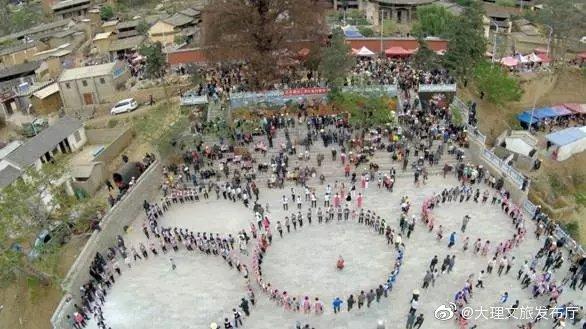
Dali Midu Wutai Dasi.
Arriving in Dali
By Air:
The nearest major airport to Dali Midu Wutai Dasi is Dali Airport (DLU), located approximately 50 kilometers from the temple. This airport provides domestic flights from several major cities in China, including Beijing and Shanghai. From the airport, you can take a taxi or a shuttle bus to Dali city.
By Train:
Dali has a train station with connections to several cities, including Kunming. High-speed trains are available, making it a convenient option. Once you arrive at Dali Railway Station, you can catch a local bus or taxi to your destination.
By Bus:
Buses from Kunming to Dali are frequent, taking about 5 to 6 hours. Various companies operate this route, and tickets can usually be purchased at bus stations or online. After arriving in Dali, you will need to transfer to another bus or taxi to reach Midu County.
Getting to Midu County
Local Transportation:
From Dali city, you can take a direct bus to Midu County. Buses depart from the Dali Long-distance Bus Station and the journey takes about 1 to 1.5 hours. Be sure to check the schedule in advance, as bus frequencies may vary.
By Taxi or Rideshare:
For more convenience, especially if you are traveling in a group or have a lot of luggage, consider hiring a taxi or using a rideshare service. This option allows for greater flexibility and can be more comfortable, particularly after a long journey.
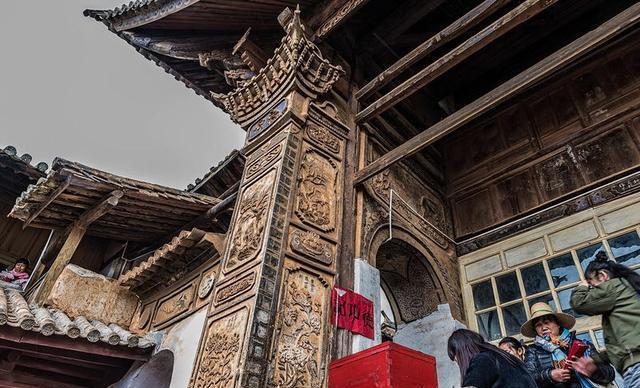
Dali Midu Wutai Dasi.
Reaching Dali Midu Wutai Dasi
Once you arrive in Midu County, the temple is located approximately 25 kilometers southwest of the county seat. Here are your options for making the final leg of your journey:
Public Bus:
There are local buses that run from Midu County to the temple. The bus service may not be very frequent, so check the local schedule ahead of time.
Taxi:
A taxi ride from Midu County to Dali Midu Wutai Dasi is the most straightforward option. It typically takes around 30 minutes, depending on traffic.
Private Car Hire:
If you’re looking for convenience and comfort, consider hiring a private car for the day. This service can provide a driver familiar with the area, allowing you to explore the surroundings at your own pace.
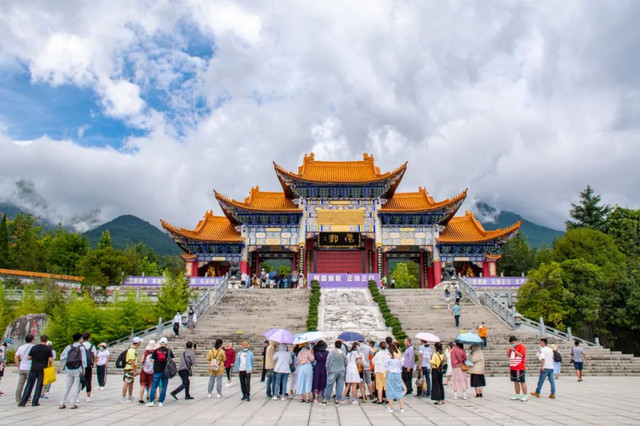
Dali Midu Wutai Dasi.
Getting Around the Temple Area
Dali Midu Wutai Dasi is situated in a serene landscape, making it very walkable. Once you arrive at the temple grounds, you can explore the various halls, gardens, and scenic spots on foot. However, if you wish to venture further into the surrounding areas, taxis and private drivers are readily available for hire.
Tips for Travelers
- Language: English may not be widely spoken, so having a translation app or a phrasebook can be helpful.
- Cash: While larger establishments may accept credit cards, it’s advisable to carry cash for smaller vendors and services.
- Plan Ahead: Transportation schedules can vary, especially in rural areas, so planning your trip in advance is essential for a smooth visit.
With these transportation options at your disposal, visiting Dali Midu Wutai Dasi can be a remarkable adventure into the heart of Yunnan’s rich cultural heritage. Enjoy your journey!
Local Cuisine and Accommodation
When exploring the serene beauty of Dali Midu Wutai Dasi, culinary delights and comfortable accommodations await to enhance your travel experience. Whether you are seeking local flavors or a cozy place to rest after a day of adventure, the region has much to offer.
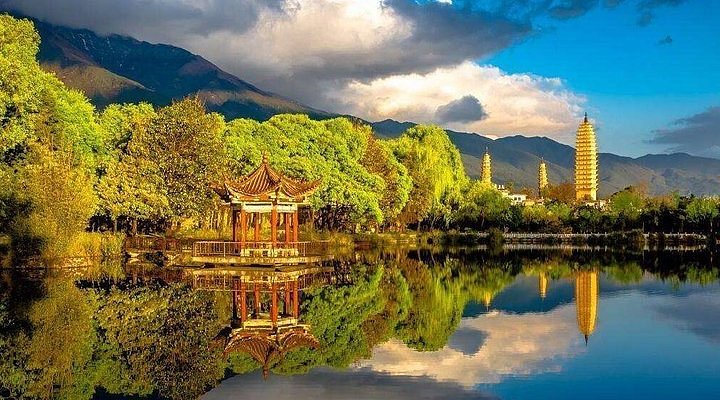
Dali Midu Wutai Dasi.
Culinary Highlights
-
Local Delicacies: Dali is renowned for its unique flavors, and Midu is no exception. Be sure to try the Midu pickled vegetables, which provide a tangy kick that complements many dishes. Another must-try is the Dali-style roasted duck, known for its crispy skin and succulent meat, often served with a side of sweet and sour sauce.
-
Food Streets: The bustling food streets in the heart of Midu are perfect for sampling various local dishes. Midu Night Market offers a plethora of stalls where you can enjoy everything from grilled skewers to Yunnan rice noodles. Don’t miss out on the spicy mushroom hot pot, which is a favorite among locals and visitors alike.
-
Traditional Restaurants: For a more sit-down dining experience, consider visiting Red Rock Restaurant, known for its authentic Yunnan cuisine and warm atmosphere. The menu features a variety of vegetarian options, reflecting the region’s agricultural abundance.
-
Cafés and Teahouses: After a day of sightseeing, unwind at one of the quaint cafés or teahouses scattered throughout Midu. Tea House of the Clouds offers a serene setting to enjoy local teas while soaking in the surrounding landscapes. Pair your tea with some traditional Dali cheese for a delightful snack.
Accommodation Options
-
Comfortable Hotels: For those seeking a blend of comfort and convenience, Midu Hotel offers modern amenities with a touch of local charm. Located close to major attractions, it features spacious rooms and an on-site restaurant serving delicious breakfasts.
-
Boutique Stays: If you prefer a more intimate experience, look into The Old Town Inn, a boutique guesthouse that captures the essence of Dali’s traditional architecture. The warm hospitality and personalized service make it a favorite among travelers.
-
Eco-Friendly Lodging: For environmentally-conscious visitors, Green Valley Eco Lodge provides a sustainable stay. This eco-lodge is surrounded by nature, offering a tranquil retreat complete with organic meals and guided nature walks.
-
Camping and Glamping: Adventurous travelers may want to consider camping options at nearby scenic spots like Jiuqi Shijia, where you can set up a tent by the river. For a more luxurious experience, glamping sites are available that combine the beauty of nature with comfortable beds and modern amenities.
Conclusion
Dali Midu Wutai Dasi is not just a feast for the eyes but also a culinary paradise and a haven for relaxation. With its diverse food offerings and a range of accommodation options, you can immerse yourself in the local culture and enjoy all that this enchanting region has to offer. Whether you are enjoying a hearty meal or resting in a cozy lodge, your stay in Midu will be nothing short of memorable.
Frequently Asked Questions
-
What are the opening hours for Dali Midu Wutai Dasi?
Dali Midu Wutai Dasi is generally open from 8:00 AM to 5:00 PM. However, it’s advisable to check ahead for any updates or changes in schedule. -
Is there an admission fee to enter the temple?
Yes, there is an admission fee to visit Dali Midu Wutai Dasi. The ticket price is approximately 50 RMB, but prices may vary, so it’s best to confirm before your visit. -
How do I get to Dali Midu Wutai Dasi from Dali City?
You can reach Dali Midu Wutai Dasi by taking a bus from Dali City to Midu County. Buses run frequently, and the journey takes about an hour. Alternatively, you can hire a taxi for a more direct route. -
Are there any guided tours available at the temple?
Yes, guided tours are available for those interested in learning more about the temple’s history and significance. You can inquire about tours when you arrive at the site. -
What should I wear when visiting the temple?
It’s recommended to wear comfortable clothing that covers your shoulders and knees, as this is a religious site. Closed-toe shoes are also advisable for walking around the temple grounds. -
Can I take photographs inside Dali Midu Wutai Dasi?
Photography is generally allowed, but it’s important to be respectful of the sacred spaces and individuals in prayer. Always check for any specific rules regarding photography when you arrive. -
Are there facilities available for visitors at the temple?
Yes, there are basic facilities such as restrooms and benches for visitors to rest. However, food and drink options may be limited, so it’s a good idea to bring your own snacks and water. -
What other attractions are nearby Dali Midu Wutai Dasi?
Nearby attractions include the East Mountain National Forest Park and the historical Nan Zhao Iron Pillar. You can also explore the beautiful natural scenery and hiking trails in the surrounding area.
Final Thoughts on Your Trip
As you wrap up your journey to Dali Midu Wutai Dasi, you’ll find that this destination is more than just a collection of stunning landscapes and ancient architecture. It encapsulates the heart of Yunnan’s rich cultural tapestry and offers a serene escape from the hustle of everyday life. From exploring the majestic Five-Platform Temple, with its intricate designs and historical significance, to wandering through the lush greenery of nearby forests and valleys, every moment spent here invites you to slow down and appreciate the beauty around you.
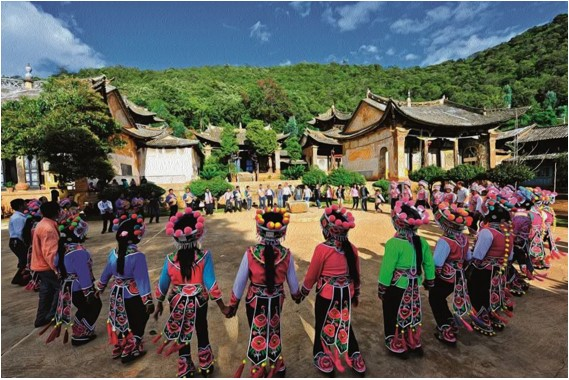
Dali Midu Wutai Dasi.
Whether you’re an adventurer seeking hidden trails or a culture enthusiast eager to delve into local traditions, Dali Midu Wutai Dasi caters to all. The ethereal charm of the region, paired with the warmth of its communities, ensures that you leave with memories that will linger long after you’ve returned home. Embrace the tranquility, soak in the rich history, and let the magic of this enchanting place inspire your next adventures. Your story in Dali Midu Wutai Dasi is just beginning—go forth and share it with the world.
